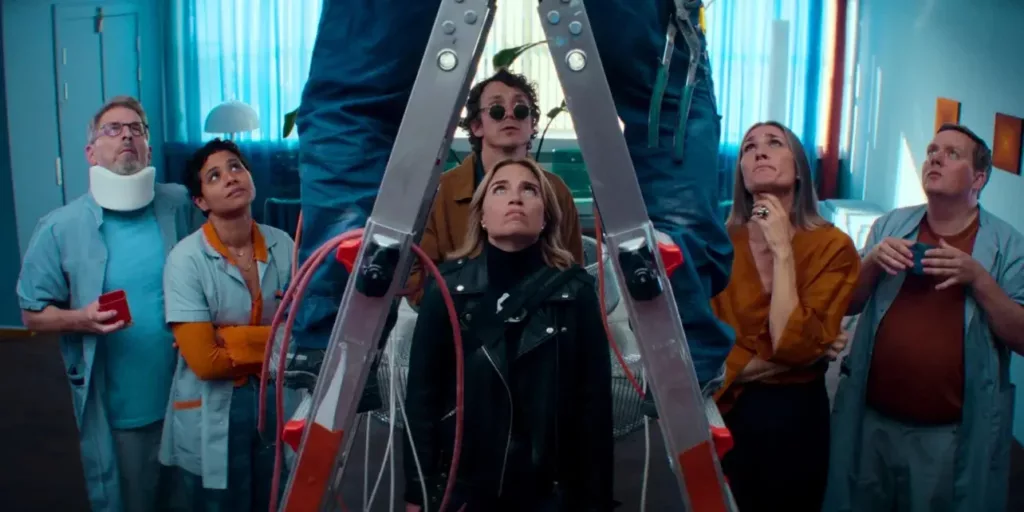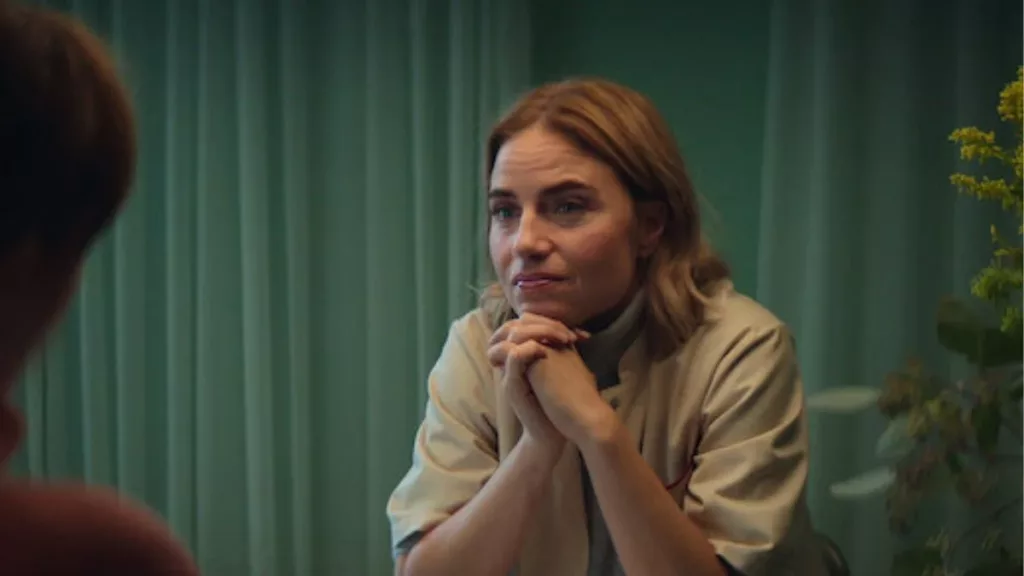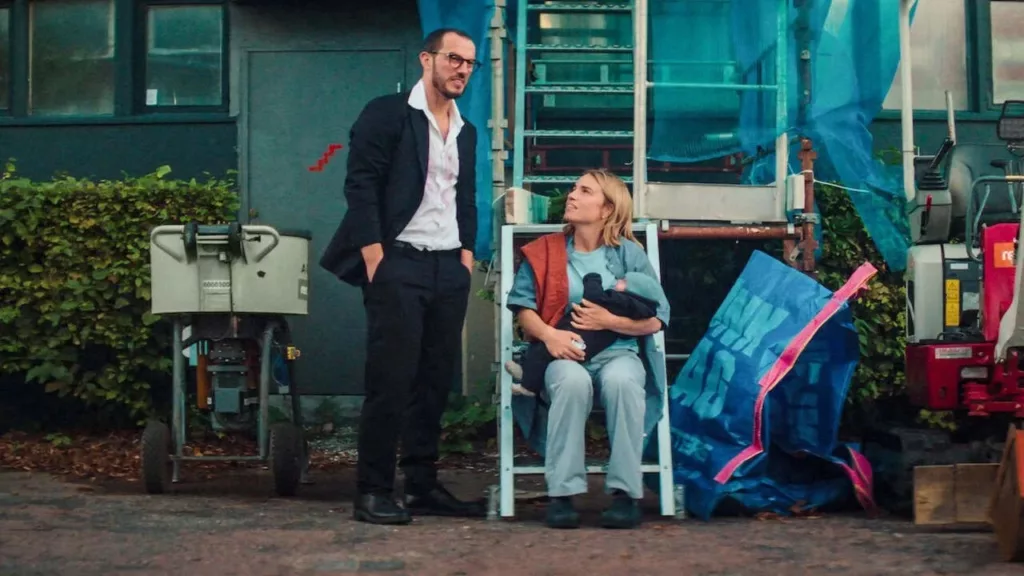Season 2 picks up with Nana attending one of those mother’s group meetings you sometimes hear about. The only thing is that Nana doesn’t seem too keen on the whole situation. While the other moms are enjoying songs about farm animals with their little ones, our leading lady looks like she’d rather be just about anywhere else.
It’s clear right away that motherhood is not coming naturally to Nana. Who can blame her, though? This was hardly a baby she planned for. Season 1 sees her make that big decision after learning her egg count is low. And now there’s a little one, and Nana finds herself stuck with all the duties other mothers seem to love.
We also get hints that Nana may be dealing with more than just newborn blues. The other moms make her skin crawl as they go on about leaves. And it seems she hasn’t even named her daughter yet. All this says to me is that Nana could be struggling with her mental health after delivering. Thankfully, the show doesn’t shy away from exploring such challenging aspects of the new mom experience.
Making Sense of a Complex Lead
Now I know, as I said before, that Season 2 finds Nana facing some struggles adapting to motherhood. But it’s clear there’s more weighing on her mind than most new parents have to deal with. See, Nana never exactly planned on having a kid like this. Let alone on her own terms, if we look back to how it all began.
Then there’s the other stuff bubbling under the surface. Reviews mention that she seems curious about the dad she never had. I can’t say I blame her for having questions there. And it leads me to wonder if that plays into some of her other decisions later on.
What’s fascinating is how the show doesn’t just gloss over these deeper layers. They steer into the messiness of dealing with postpartum depression head-on. We see Nana feeling all sorts of emotions; she thinks a mom isn’t supposed to. The guilt when she needs a break hits hard.
Another thing I appreciate is how natural the relationships feel. Scenes between Nana and her mom feel so authentic, it’s like we’re really catching snippets of their lives. And how she bonds with her little one, in her own way, adds texture.
So in the end, for all her flaws, maybe Nana’s complexity is what keeps me watching. Real people aren’t one-dimensional, and it makes for richer storytelling when exploring that gray area in between.
Relationships Come to the Fore
While Nana remains the focus of Baby Fever, Season 2 does a solid job developing others who orbit around her. Simone has been a loyal friend throughout it all. She seems to understand Nana in a way that few others do. Their dynamic adds layers considering all that’s happened.
Then there’s Nana’s mom, Lise. Taking on more of a caregiver role now, their interactions show a lifetime of baggage. Scenes between these two feel so authentic, like you’re witnessing talks between real family.
Of course, Mathias comes back into the picture once he learns the truth. As difficult as that conversation was, it opens the door to exploring emotion on both sides. How their past mingles with present responsibilities makes for engaging drama.
We also meet a newcomer, Hampus, who offers a new professional dynamic. Banter between him and Nana hints there may be more beneath surface tensions. Whether his role blossoms, only time will tell.
All in all, these relationships breathe life into Nana’s story and give a deeper glimpse at her world outside of work. Delving into how personal complexities influence career drives just one more layer to this show’s slice of life style.
Tackling Complex Themes with Nuance
One thing that stands out about watching Baby Fever is how it freely delves into tricky topics others might shy away from. Nana’s actions back in season one were definitely questionable, to say the least. Stealing sperm and getting pregnant without consent raises some serious ethical issues.
And you can’t hide your eyes from the legal implications of what Nana did either. There is no doubt she belongs in the courtroom if roles are reversed. How the show addresses such tensions is admirable, though, showing there’s rarely a simple answer when reality gets messy.
Relationships and motherhood nowadays challenge traditional roles too. Nana’s struggles reflect shifting tides there as much as her own demons. The series uses her journey to have thoughtful dialogue on modern issues like career vs. family demands.
All that said, the writers avoid coming down firmly on any side. Characters aren’t one-note villains but complex people with motives open to debate. Mistakes get made, and the aftermath stays real.
At its heart, this remains the very human story of a woman coming to terms with past decisions. The hard questions Baby Fever poses serve to enrich rather than accuse. In finding nuance where others give simplistic solutions, it leaves viewers thoughtful, not preachy.
Bringing the Complexities to Life
One thing that’s clear from watching Baby Fever is how much the performances drive this show’s success. Leading the way is Josephine Park as the complex and conflicted Nana. Without giving too much away, she has some intense scenes that are tough to watch yet impossible to look away from. You feel every emotion bubbling beneath the surface.
It’s a testament to Park’s skills that such a potentially unlikable character remains compelling. She finds humanity in Nana that keeps you invested in her journey, even when choices leave others cold. It is not an easy feat when dealing with such messy material.
Smart directing is another big plus. With short episodes, they waste little time yet let moments breathe naturally. Scenes feel brisk but not abrupt. Episode beats land just right to keep flaws and positives in focus.
All the while, the cinematography brings an intimate window into these characters’ private spaces. Whether in a in a clinic or having family conversations, you really feel like a welcomed guest in their lives.
So while the writing takes risks, these top-notch visual elements keep Baby Fever digestible and rewarding to watch, warts and all. It’s that balance that allows such challenging topics to resonate.
Room for growth
Don’t get me wrong, there’s a lot to like about Baby Fever as is. But with any show, there’s always a chance to take things higher too. Here are a few ideas on how Season 3 might step things up if the creators go down that path.
Bringing more focus could serve the plot well. Sometimes things get a little scattered, spinning so many plates. Tighter arcs for side characters might give their stories room to breathe better.
Expanding certain relationships could add layers. Imagine what exploring Nana’s dad’s history might yield. Or showing Simone’s life beyond the friend role could offer surprises. Developing new romances introduces unpredictability too.
Themes are there, but hammering them home more boldly may lead to richer dialogue. Imagine tackling today’s debates on motherhood or modern love further. Challenge perceptions in thought-provoking ways.
Of course, big changes could disrupt the poignant authenticity. But tweaks bringing complexity versus controversy inspire dedicated discussion. The show flourishes, tackling real-life issues realistically.
Mostly, I’d say, keep trusting viewers like they do now. Continue shining light on shadows, not afraid to question or be questioned. In that spirit, Baby Fever’s best chapters may yet to come.
The future looks bright
With two seasons down, there’s no question Baby Fever has proven it’s not afraid to shine a messy light on life’s dilemmas. And while Nana’s journey may seem like a darker place at times, the show finds brightness in focusing on the very human need to understand oneself and relationships better.
Personally, I think this story remains ripe with potential. Sure, addressing heavy themes demands care, but these creators have the skill. While loose ends could use wrapping, seeds sewn so far bode well if they till more fertile narrative ground. And of course, Park’s captivating lead alone makes following this evolution rewarding.
All in all, this feels like a series still discovering its strengths rather than losing steam. Just as experiences can age like fine wine when revisited down the line, I’ve got a feeling Baby Fever may also reward those open to letting its complexities deepen with repeat viewing. For now, though, curiosity holds the key the key to seeing where realism and heart may yet guide these compelling characters’s journeys.
The Review
Baby Fever Movie Season 2
While Season 2 sees Nana’s unethical actions still unresolved and her fluctuating development raise complex questions, the series merits praise for its willingness to shine an unvarnished light on the many nuanced challenges facing today’s parents. Anchored by a fearlessly vulnerable lead performance, Baby Fever delves into issues rarely addressed with its compelling blend of humor and humanity. Not an easy watch yet compelling and thoughtful in equal measure, this dramedy proves sometimes the messiest conversations are those most worth having.
PROS
- Complex, compelling lead performance by Josephine Park
- Nuanced exploration of difficult modern themes like consent, ethics, and mental health
- Authentic depictions of family dynamics and new mother struggles
- Subtle yet impactful commentary on society's expectations
CONS
- Nana remains an unresolved and morally ambiguous character
- Secondary plots and characters could be more well-developed
- Heavier material may not appeal to all audiences






















































Discussion about this post